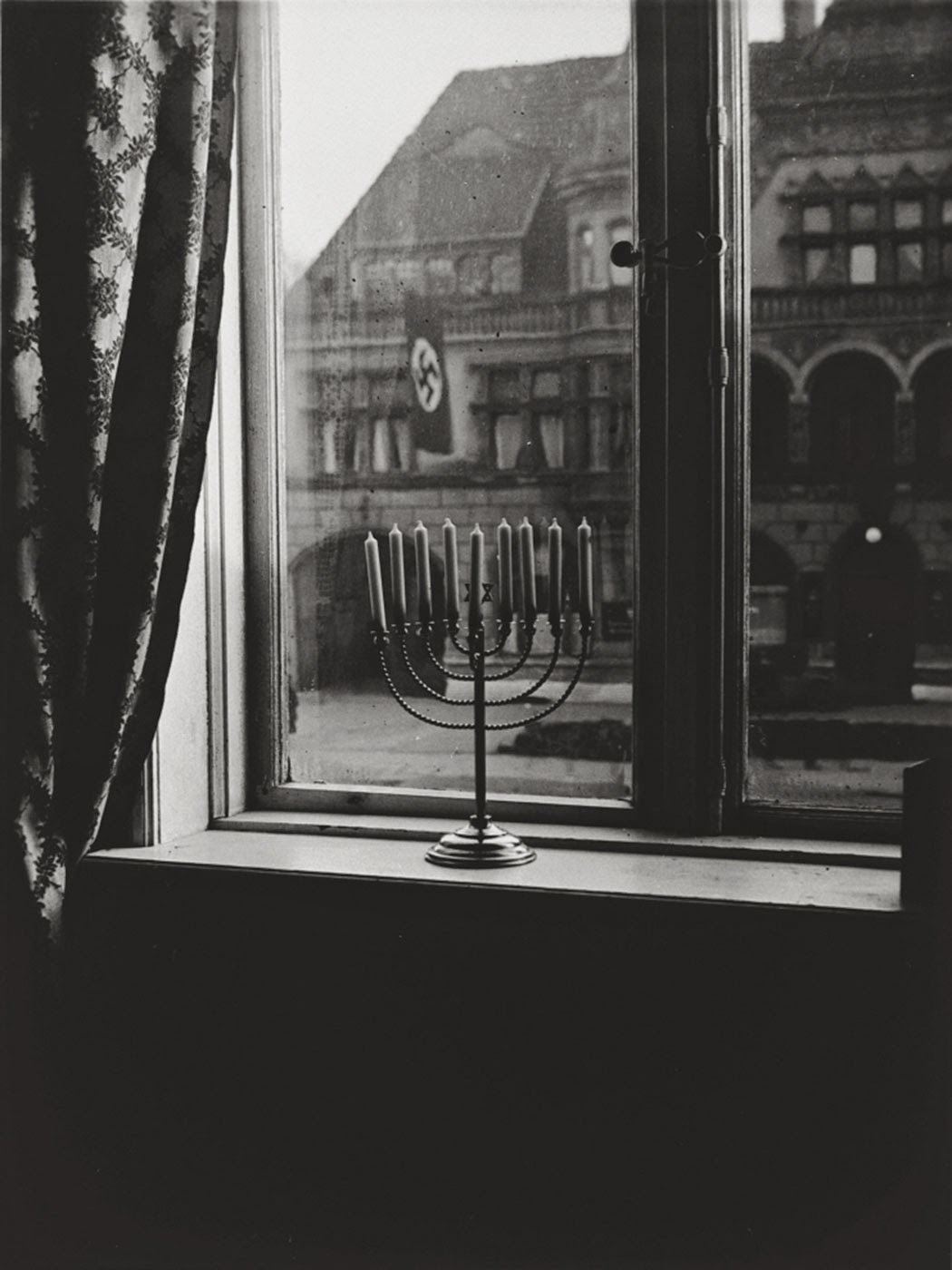Light
Posted: Mon, 19 Dec 2022 13:36
This striking photograph was taken by Rachel Posner from the window of her home in Kiel, Germany in 1931. On the back she wrote:
"Death to Judah"
So the flag says
"Judah will live forever"
So the light answers
She was right in one way in that Hitler and his Nazi henchmen were defeated in the Second World War in a rejection of fascism. That loss came at a terrible price and saw the murder of over six million of Rachel's religious family. She took this menorah with her to Israel as her family were forced into exile in 1933. To this day her family light the Hanukkah candles, as they celebrate their 'Festival of Light', giving thanks for the re-dedication of the Jerusalem Temple two centuries before the birth of Christ. They join millions, including many gentiles, across the world who celebrate the gift of light. As many of us live in multi-cultural societies, it is good that we learn about our respective faiths and cultures—ignorance and a failure to respect each other can lead to something as wicked and morally corrupt as the Holocaust. As Rachel and her family discovered, the attempt to systematically destroy their faith began with simple name calling and banning Jews from entering public buildings. Once this became accepted, then the cramming of Jews into ghettos and transportation to concentration camps became acceptable. Hitler's 'final solution' began in such a simple and easy way: blame the Jews for all the economic problems that Germany faced after the First World War. Then use the Jews as scapegoats. Then separate them from others. Then allow the evil to happen.
It is telling that this great Jewish celebration occurs during the Christian season of Advent when wreathes of light symbolise our growing closer to the celebration of the birth of the Lord of Light— 'a light that the darkness could not overcome' (Jn 1:5). In Islam the feast of Eid Ul-Fitr marks the end of the Ramadan fast. This celebration also occurs on the day of the new moon, symbolising a new start after this period of deprivation: bright clothes are worn, and bright lights often decorate homes and places of worship. People of faith are well aware of how the forces of evil try to block out the light and plunge us into necessarily darkness. People of faith will always prefer to stand in the light.
For Rachel that Nazi flag was a symbol of all that was wrong with her native Germany under the rule of Hitler: a refusal to accept the other. Sadly, in another way, we have not listened to the lessons of history as neo-Nazi groups seem to thrive, very often with the support of politicians and influencers. In a time in our history when we need to be reaching out to others, it seems that some have closed down, encouraged by sensational media sound bites. As a humanity born into light, we need to fight strongly for the integrity of the truth—not a version of truth that has been twisted and manipulated by those who only want a darkness. More than ever, we need to explore the common heritage we share that does not define us according to sexuality, ethnicity or religion. In Winsome Pinnock's exploration of life in post-war Britain, 'Faith, Hope and Glory', one of the heroes, Hope discovers, on coming to England to work as a nurse from her native Antiqua, that she has somehow become 'coloured' in the eyes of those she meets in London: she had always seen herself as a busy working wife and mother—she was Hope.
It is so sad to see influential politicians jumping on the bandwagon of discrimination. They will always present their case in the most reasoned of ways, but then, so did Hitler. The darkness of that swastika flag hanging in the town square of Kier can never define a society—we must focus on Ruth's menorah, and the deep and lasting light that it will bring. In these dark December nights, as we light another candle, or share another goody from our advent calendar, we share the hope that is engrained into our faith. You might be that needed light in someone's life today: share a funny meme or tell a daft joke. Do not be afraid to pick up the phone and re-connect with family or friends—even if it means you have to make a deep apology. You can be the light in somebody's darkness today.
In these post-Covid days, when we seem to take three steps forward and two steps back, hope needs to be obvious and celebrated. We are not going to let the forces of darkness win—no matter how powerful and rich the politicians leading us down dark alleys might be. We share the hope of Rachel's great-grandson, Akiva who wrote these lines as he celebrated Hanukkah in 2909, never forgetting his grandparents forced from their native land through pure evil. I find his work reminiscent of the great 'O Antiphons that we celebrate in the Christmas Novena, but then that should be no surprise, as we are Children of Abraham too:
In 5692 the Menorah is in exile, it stands in the window
It challenges the party flag that doesn't yet rule
"Judah die!" it says
And Grandma 's rhyme responds
In its own tongue, without despair:
So, the flag says, but our candle answers and declares
"Judah will live forever"
In 5770 the menorah stands in the window once again
Facing the flag of the ruling State
The descendant Akiva, named for his great-grandfather
Salutes through the window and lights the menorah
Grandmother, give thanks above and say a prayer
That "the Redeemer will come to Zion" and not delay"
Author: Fr Gerry O'Shaughnessy SDB
Image: Rachel Posner, photographer, Public domain, via Wikimedia Commons
